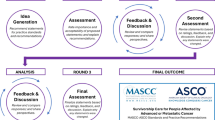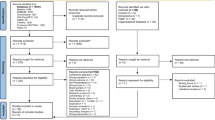Abstract
Cancer is a growing burden in Tanzania with high mortality rates. Low level of cancer awareness in the population and health workforce is one of the reasons. This study aimed to evaluate the effects of a cancer awareness training for community-level healthcare providers in Kilimanjaro Region. Main research interest was to assess the effects of the training on cancer knowledge of the healthcare workers and its application into practice. Community health workers (CHWs) (n = 25) and dispensary healthcare workers (DHCWs) (n = 16) attended cancer awareness trainings. Three training days over a 3-month period were provided for each group. Pre- and post-training assessments of the cancer knowledge were conducted on each training day. Application of the knowledge into practice was assessed at follow-up and complemented with qualitative data. Analysis of the questionnaires was provided by descriptive statistics. Qualitative data were analyzed by semantic thematic analysis. Both groups showed a statistically significant increase in knowledge after the three training days: CHWs + 10% (CI 95% = 2–18%, p = 0.015) and DHCWs 24.4% (CI 95% = 13–36%, p = 0.002). The community-level healthcare providers also started to apply the new cancer knowledge into practice and reported to feel more confident in cancer control. The pilot cancer awareness training was effective in increasing cancer knowledge and its application. It strengthened their confidence in care delivery and referral practices as well as education of the population. This concept of cancer awareness training might be also applicable to other countries in SSA.


Similar content being viewed by others
References
Global Burden of Disease Cancer, C (2018) Global, regional, and national cancer incidence, mortality, years of life lost, years lived with disability, and disability-adjusted life-years for 29 cancer groups, 1990 to 2016: A systematic analysis for the global burden of disease study. JAMA Oncol. https://doi.org/10.1001/jamaoncol.2018.2706
Morhason-Bello IO, Odedina F, Rebbeck TR, Harford J, Dangou J-M, Denny L, Adewole IF (2013) Challenges and opportunities in cancer control in Africa: a perspective from the African Organization for Research and Training in Cancer. Lancet Oncol 14(4):e142–e151. https://doi.org/10.1016/S1470-2045(12)70482-5
Simard EP, Jemal A (2013) Commentary: Infection-related cancers in low- and middle-income countries: challenges and opportunities. International Journal of Epidemiology 42(1):228–229. https://doi.org/10.1093/ije/dys216
GLOBOCAN (2012). Cancer Fact Sheets. Available at: http://globocan.iarc.fr/Pages/fact_sheets_cancer.aspx [accessed 24.07.19]
Busolo DS, Woodgate RL (2015) Cancer prevention in Africa: a re-view of the literature. Global Health Promotion 22(2):31–39. https://doi.org/10.1177/1757975914537094
Shulman LN, Willett W, Sievers A, Knaul FM (2010) Breast cancer in developing countries: opportunities for improved survival. Journal of Oncology 2010:595167. https://doi.org/10.1155/2010/595167
Rick TJ, Merinyo JJ (2017) Call for breast cancer risk factor education in countries with limited health care resources. Journal of Global Oncology 3(4):427–428. https://doi.org/10.1200/JGO.2016.007781
Urasa M, Darj E (2011) Knowledge of cervical cancer and screening practices of nurses at a regional hospital in Tanzania. African Health Sciences 11(1):48–57
Rick TJ, Deming CM, Helland JR, Hartwig KA (2019 Feb) (2017). Cancer training for frontline healthcare providers in Tanzania. J Cancer Educ 34(1):111–115. https://doi.org/10.1007/s13187-017-1274-8
Sue K, Rosenberg J, Weintraub R (2016) Addressing Tanzania’s health workforce crisis through a public-private partnership: the case of TTCIH. Harvard Business Publishing
Foundation for Cancer Care Tanzania (2015). Meeting the challenge of cancer care in northern Tanzania. A program for comprehensive and sustainable care. Minnesota. Retrieved from: https://www.iccp-portal.org/sites/default/files/resources/FCCT-White-Paper.pdf [accessed 16.12.18]
Mills A, Ataguba JE, Akazili J, Borghi J, Garshong B, Makawia S et al (2012) Equity in financing and use of health care in Ghana, South Africa, and Tanzania: implications for paths to universal coverage. The Lancet 380:126–133. https://doi.org/10.1016/S0140-6736(12)60357-2
National Bureau of Statistics, United Republic of Tanzania (2013) 2010 Population and housing census, Population Distribution by Administrative Areas. Dar es Salaam.
O'Donovan J, O'Donovan C, Kuhn I, Sachs SE, Winters N (2018) Ongoing training of community health workers in low-income and middle-income countries: a systematic scoping review of the literature. BMJ Open 8(4):e021467. https://doi.org/10.1136/bmjopen-2017-021467
Pathfinder International/Tanzania (2006). Mapping of community home based care services in five regions of the Tanzania mainland. Dar es Salaam.
Olaniran A, Smith H, Unkels R, Bar-Zeev S, van den Broek N (2017) Who is a community health worker? - a systematic review of definitions. Global Health Action 10(1):1272223. https://doi.org/10.1080/16549716.2017.1272223
Wane, W. & Martin, G. (2015). Health service delivery in Tanzania (English). Washington, D.C.: World Bank Group. Retrieved from: http://documents.worldbank.org/curated/en/520361468185934337/Health-service-delivery-in-Tanzania [accessed 10.11.18]
Ochomo EO, Atieli H, Gumo S, Ouma C (2017) Assessment of community health volunteers’ knowledge on cervical cancer in Kadibo Division, Kisumu County: a cross sectional survey. BMC Health Services Re-search 17(1):E359. https://doi.org/10.1186/s12913-017-2593-5
Ministry of Health and Social Welfare (MoHSW), The United Republic of Tanzania (2012) National Cancer Control Strategy (NCCS), 2013-2022. Dar es Salaam. Retrieved from: https://www.iccp-portal.org/system/files/plans/NCSS%20Book.pdf [accessed 10.11.18]
Peters LM, Soliman AS, Bukori P, Mkuchu J, Ngoma T (2010) Evidence for the need of educational programs for cervical screening in rural Tanzania. Journal of Cancer Education 25:153–159. https://doi.org/10.1007/s13187-009-0018-9
Maher D, Cometto G (2016) Research on community-based health workers is needed to achieve the sustainable development goals. Bulletin of the World Health Organization 94:786. https://doi.org/10.2471/BLT.16.185918
Stanifer JW, Patel UD, Karia F, Thielman N, Maro V, Shimbi D et al (2015) The determinants of traditional medicine use in Northern Tanzania: a mixed-methods study. PloS One 10:e0122638. https://doi.org/10.1371/journal.pone.0122638
Lunyera J, Wang D, Maro V, Karia F, Boyd D, Omolo J et al (2016) Traditional medicine practices among community members with diabetes mellitus in Northern Tanzania: an ethnomedical survey. BMC Complementary and Alternative Medicine 16:282. https://doi.org/10.1186/s12906-016-1262-2
Kwesigabo G, Mwangu MA, Kakoko DC, Warriner I, Mkony CA, Killewo J et al (2012) Tanzania's health system and workforce crisis. Journal of Public Health Policy 33(Suppl 1):S35–S44. https://doi.org/10.1057/jphp.2012.55
UNICEF & WHO (2018) Declaration of Astana: Global Conference on Primary Health Care, Astana, Kazakhstan, 25 and 26 October 2018. Geneva: WHO. Retrieved from: https://www.who.int/docs/default-source/primary-health/declaration/gcphc-declaration.pdf [accessed 10.01.19]
Göhlich M (ed) (2014) Pädagogische Theorien des Lernens, 2nd edn. Beltz Juventa, Weinheim
Author information
Authors and Affiliations
Corresponding author
Ethics declarations
Conflict of Interest
The authors declare that they have no conflict of interest.
Additional information
Publisher’s Note
Springer Nature remains neutral with regard to jurisdictional claims in published maps and institutional affiliations.
Rights and permissions
About this article
Cite this article
Singer, R., Henke, A., Alloyce, J.P. et al. Repetitive Cancer Training for Community Healthcare Workers: an Effective Method to Strengthen Knowledge and Impact on the Communities: Results from a Pilot Training at Kilimanjaro Region, Tanzania. J Canc Educ 36, 470–477 (2021). https://doi.org/10.1007/s13187-019-01648-6
Published:
Issue Date:
DOI: https://doi.org/10.1007/s13187-019-01648-6




